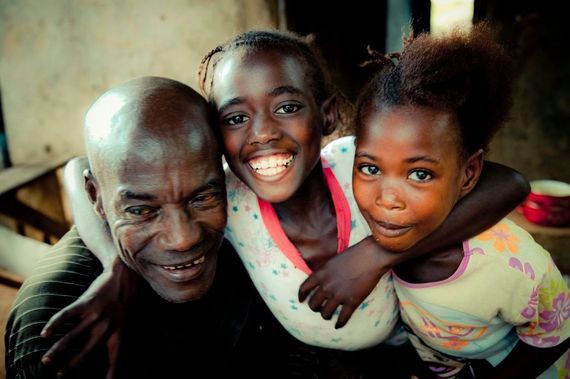Strangers are driving through rural regions of Sierra Leone with bullhorns, shouting instructions about how to stay safe from the Ebola virus. Their intentions may be admirable, but their tactics are probably ineffective. Loud voices do not always get heard.
Especially in Sierra Leone, where a vein of suspicion runs deep, a legacy of grinding poverty and a brutal civil war ignited by blood diamonds. Rumors swirl here as the epidemic grows -- villagers whisper of a government plot, of children snatched away at night by men in white suits, of bodies that vanish. Meanwhile, the international media paints a picture of hapless African victims, ignorant of infectious disease pathways and unwilling to take commonsense public health measures. Trust on all sides erodes.
We need to do things differently in order to blockade the virus.
Eight years ago, I came to the Kono District of Sierra Leone as a documentary filmmaker following the journey of a diamond from the earth to the consumer. In a sense, I have never left.
In the rural village where I was filming, more than 400 students were braving torrential rains in a roofless school to learn. We raised $6,000 and put a roof and cement floor on the dilapidated building, repaired toilets, and added new benches and iron doors that lock. When the locals finally stopped celebrating that achievement, we launched Shine on Sierra Leone to do much more. Our mission is to create sustainable programs that promote thriving, self-sufficient communities.
By many measures, Sierra Leone is a troubled land. Diamond miners are paid $1.33 and a cup of rice for their daily labors and life expectancy at birth is 45 years. But cold statistics do not take a full measure. This is a land of defiant optimism in the face of brutal experience. The music is joyful, the villagers always ready to dance. From the horror of recent history has emerged a people of tremendous warmth, and a younger generation that believes in a brighter future.
At Shine on Sierra Leone, we push them to be architects of their own design. We do not do for the people of the region, we do with them, as a partnership, not a charity. With our training, local residents have mastered the earthbag technique, filling empty rice bags with a plaster of cement, clay and sand to produce a cheap, disaster-proof building block. We've trained over 12,000 individuals to become computer literate. We offer microloans of up to $1,000 apiece, and have a repayment rate that never falls below 97 percent. We expect success, and we get it.
Cut to Ebola. When those bullhorn-outfitted vehicles arrive, the villagers respond as anyone might who has known trauma at the hands of strangers -- they flee into the bush. When the government mandated a three-day lockdown to find hidden disease, it overlooked the daily food and water needs of people without a storehouse of provisions. Who can blame residents for wondering where true danger lies?
Local leaders in the Kono District started calling us, and asking, "What are we supposed to believe? What is going on?" Shine on Sierra Leone has begun to engage vigorously with the community to combat the epidemic. Lockdowns can be an effective containment tool, but they have to be accompanied by deep dialogue and adequate supplies. In a society that loves to touch, messages about how to stay safe, tend ailing family members, and bury the dead in defiance of longstanding tradition must be delivered by messengers who understand the culture and whose knock at the door is welcome.
Shine on Sierra Leone is now partnering with Wellbody Alliance, a grassroots organization providing the only comprehensive health care in the region. Together, we are training community health workers, distributing risk-reduction kits and low-literacy educational materials, and assembling protective gear (gloves, gowns, face masks, waste bags, etc.) and basic supplies (thermometers, chlorine, water filters). We have developed a protocol that includes house-by-house fever checks, supportive observation of those with a high temperature, and an isolation and treatment plan for individuals with active infection. Equally important, it includes personal attention, door-to-door deep dialogue, and a measure of love, healing ingredients absent in hospital wards that lack capacity to provide such critical "extras."
We are alone in this effort. The government claims the district has no Ebola infections, although we have seen dozens of them, and many deaths. The absence of basic surveillance is just one mark of Sierra Leone's feeble health care infrastructure. It was shocking for us to realize that no one is coming to our rescue -- not the national government and not the large NGOs. There is no coordinated international effort on our ground.
That's the reality, and we're stepping up. We've got the person power, the passion, and the community ties to turn back the Ebola terror in Kono.
Learn more HERE.
Thank you for your support, shine on.
